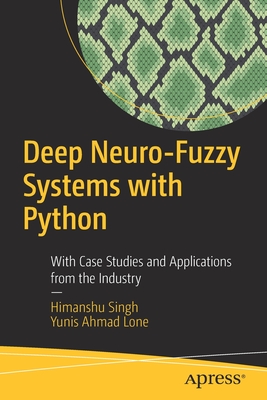Computational Intelligence Paradigms: Theory & Applications Using MATLAB
暫譯: 計算智慧範式:使用 MATLAB 的理論與應用
Sumathi, S., Paneerselvam, Surekha
- 出版商: CRC
- 出版日期: 2019-10-07
- 售價: $2,990
- 貴賓價: 9.5 折 $2,841
- 語言: 英文
- 頁數: 851
- 裝訂: Quality Paper - also called trade paper
- ISBN: 0367384558
- ISBN-13: 9780367384555
-
相關分類:
Matlab
-
其他版本:
Computational Intelligence Paradigms: Theory & Applications using MATLAB
商品描述
Offering a wide range of programming examples implemented in MATLAB(R), Computational Intelligence Paradigms: Theory and Applications Using MATLAB(R) presents theoretical concepts and a general framework for computational intelligence (CI) approaches, including artificial neural networks, fuzzy systems, evolutionary computation, genetic algorithms and programming, and swarm intelligence. It covers numerous intelligent computing methodologies and algorithms used in CI research.
The book first focuses on neural networks, including common artificial neural networks; neural networks based on data classification, data association, and data conceptualization; and real-world applications of neural networks. It then discusses fuzzy sets, fuzzy rules, applications of fuzzy systems, and different types of fused neuro-fuzzy systems, before providing MATLAB illustrations of ANFIS, classification and regression trees, fuzzy c-means clustering algorithms, fuzzy ART map, and Takagi-Sugeno inference systems. The authors also describe the history, advantages, and disadvantages of evolutionary computation and include solved MATLAB programs to illustrate the implementation of evolutionary computation in various problems. After exploring the operators and parameters of genetic algorithms, they cover the steps and MATLAB routines of genetic programming. The final chapter introduces swarm intelligence and its applications, particle swarm optimization, and ant colony optimization.
Full of worked examples and end-of-chapter questions, this comprehensive book explains how to use MATLAB to implement CI techniques for the solution of biological problems. It will help readers with their work on evolution dynamics, self-organization, natural and artificial morphogenesis, emergent collective behaviors, swarm intelligence, evolutionary strategies, genetic programming, and the evolution of social behaviors.
商品描述(中文翻譯)
提供一系列使用 MATLAB(R) 實作的程式範例,計算智慧範式:使用 MATLAB(R) 的理論與應用 介紹了計算智慧 (CI) 方法的理論概念和一般框架,包括人工神經網路、模糊系統、演化計算、遺傳演算法及程式設計,以及群體智慧。書中涵蓋了許多在 CI 研究中使用的智能計算方法和演算法。
本書首先聚焦於神經網路,包括常見的人工神經網路;基於數據分類、數據關聯和數據概念化的神經網路;以及神經網路的實際應用。接著討論模糊集合、模糊規則、模糊系統的應用,以及不同類型的融合神經模糊系統,然後提供 MATLAB 的 ANFIS、分類與回歸樹、模糊 c-均值聚類演算法、模糊 ART 地圖和 Takagi-Sugeno 推理系統的示例。作者還描述了演化計算的歷史、優點和缺點,並包含解決的 MATLAB 程式以說明演化計算在各種問題中的實作。在探討遺傳演算法的運算子和參數後,他們涵蓋了遺傳程式設計的步驟和 MATLAB 程式。最後一章介紹了群體智慧及其應用、粒子群優化和蟻群優化。
這本內容豐富的書籍充滿了實作範例和章末問題,解釋了如何使用 MATLAB 實作 CI 技術以解決生物問題。它將幫助讀者在演化動力學、自組織、自然與人工形態生成、突現集體行為、群體智慧、演化策略、遺傳程式設計以及社會行為的演化方面的工作。
作者簡介
S. Sumathi is an assistant professor in the Department of Electrical and Electronics Engineering at PSG College of Technology, Coimbatore, India. Her research interests include neural networks, fuzzy systems, genetic algorithms, pattern recognition and classification, data warehousing and mining, operating systems, and parallel computing.
Surekha Paneerselvam is a lecturer in the Department of Electronics and Communication Engineering at Adhiyamaan College of Engineering, Hosur, India. Her research interests include robotics, virtual instrumentation, mobile communication, and computational intelligence.
作者簡介(中文翻譯)
S. Sumathi 是印度科印巴多的 PSG 科技學院電氣與電子工程系的助理教授。她的研究興趣包括神經網絡、模糊系統、遺傳算法、模式識別與分類、數據倉儲與挖掘、操作系統以及並行計算。
Surekha Paneerselvam 是印度霍蘇爾的 Adhiyamaan 工程學院電子與通信工程系的講師。她的研究興趣包括機器人技術、虛擬儀器、行動通信以及計算智能。






























